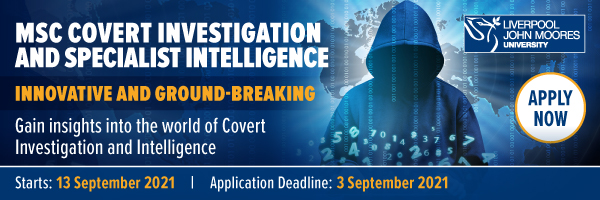The MSc in Covert Investigation and Specialist Intelligence programme started in September 2020 and in its first year recruited over 40 students. Students are drawn from wide variety of military and law enforcement backgrounds including serving police staff from the National Crime Agency, Merseyside Police, Nottinghamshire Police, West Midlands Police and the British Transport Police.
It is vital to stay abreast of the impact of the latest legislation such as the Covert Human Intelligence Sources Bill as well as the latest research regarding what works effectively within Covert Policing. LJMU has one of the largest policing centres in the UK, and students can be confident of both.
Covert techniques are some of the most powerful weapons available to the state in its ongoing effort to identify, disrupt and prosecute terrorists and serious organised criminals. However, these threats are ever-changing and accordingly, those charged with the management of covert techniques and specialist intelligence must continually adapt, innovate and evolve if they are to successfully counter threats.
To do this effectively, it is vital to stay abreast of the impact of the latest legislation such as the Covert Human Intelligence Sources Bill as well as the latest research regarding what works effectively within Covert Policing. LJMU has one of the largest policing centres in the UK, and students can be confident of both.
The programme examines key themes and debates that shape policy and practice associated with intelligence and covert investigations. It addresses critical areas of contemporary concern within the field including effectiveness, value, lawfulness, risks and ethics. It does so by exploring a wider range of subjects including HUMINT collection, the elicitation of intelligence, investigative interview models, covert techniques, underpinning legislation, oversight mechanisms, intelligence sharing and analysis.
The material is delivered by widely published academics and by experienced practitioners within covert, intelligence and legal arenas including: Dr Ian Stanier, a senior lecturer at Liverpool Centre for Advanced Policing Studies; Mick Creedon QPM, with over 37 years of experience in policing and security; a former Scotland Yard detective and Professor Sir Jon Murphy QPM, with an almost 20-year unbroken career as a detective rising to the rank of Detective Superintendent Senior Investigating Officer (SIO), before returning to uniform duties as Chief Constable as well as myself, a Reader in Police Studies at the Liverpool Centre for Advanced Policing Studies.
Application Deadline closes on the 3 September 2021
The MSc in Covert Investigation and Specialist Intelligence starts on the 13 September 2021 and the Application Deadline closes on the 3 September 2021.
To join the course, submit your application here and get a copy of the programme prospectus. For more information about the course or for guidance with your application email [email protected] or call +44 (0) 20 8052 0602.
Scholarships & funding
- Government funding for the 2021 to 2022 academic year is available
If you are a UK or EU national, or have UK ‘settled status’, and have lived in the UK or the EU (or wider EEA) for the last 3 years, plus will be living in the UK on the first day of your course, and haven’t been awarded an MSc, MA, MBA or PhD already, you may be eligible for a loan of over £10,906 from the UK Government to study this course.
Contact us for information or visit the UK Government Funding for Postgraduate Study page here
- Scholarships for people of colour on policing course
Scholarships for police officers and policing staff seeking a career in covert investigations and intelligence have been made available for people of colour on a specialist course run by The Liverpool Centre for Advanced Policing at LJMU (LCAPS).
The focus is on the development and retention of staff in national units including the National Crime Agency and UK Counter-Terrorism Policing.
To find out more information about this scholarship please visit the LJMU website here



